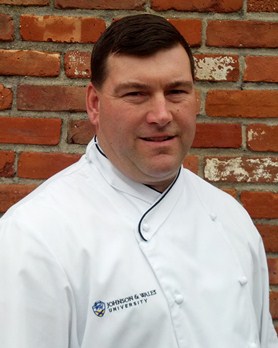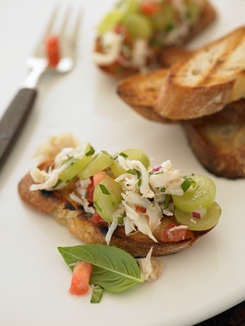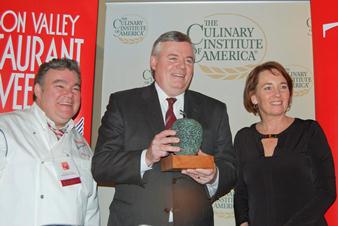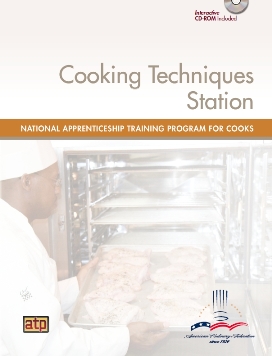50-Minute Classroom: Teaching Nutrition, Part 2
 In a continuation of last month’s focus on teaching nutrition within a short class period, Chef Weiner explains how to emphasize the remaining six of 10 unchanging basic facts.
In a continuation of last month’s focus on teaching nutrition within a short class period, Chef Weiner explains how to emphasize the remaining six of 10 unchanging basic facts.
By Adam Weiner, CFSE
Last month I wrote about why culinary teachers find it challenging to teach about nutrition, and gave the first four topics to cover in a 50-minute classroom:
1. To lose weight, you must consume fewer calories than you burn (or burn more than you consume).
2. To be healthy, you must consume a wide variety of foods.
3. Generally, the closer food is to its natural form, the healthier it is.
4. Yes, Virginia, you really do need to have some fat in your diet.
This month we finish our list of 10 things to teach about nutrition.

 A combination high school, urban farm and environmental education center in Connecticut is leading the way as a model in healthy lifestyles for students from all socioeconomic backgrounds.
A combination high school, urban farm and environmental education center in Connecticut is leading the way as a model in healthy lifestyles for students from all socioeconomic backgrounds. An e-learning module focusing on the versatility, nutrition and palate-pleasing power of California table grapes.
An e-learning module focusing on the versatility, nutrition and palate-pleasing power of California table grapes. A team of Anne Arundel Community College culinary-arts students swept the competition at the 13th Annual Gumbo Fest in Annapolis. Team Anne Arundel won first place in both categories—the Judge’s Choice and People’s Choice—at the Feb. 26 competition at the Double Tree Hotel in Annapolis. Eleven other teams from area restaurants also competed in this year’s Gumbo Fest.
A team of Anne Arundel Community College culinary-arts students swept the competition at the 13th Annual Gumbo Fest in Annapolis. Team Anne Arundel won first place in both categories—the Judge’s Choice and People’s Choice—at the Feb. 26 competition at the Double Tree Hotel in Annapolis. Eleven other teams from area restaurants also competed in this year’s Gumbo Fest. Dr. Tim Ryan, CMC, president of The Culinary Institute of America (CIA), is the recipient of The Valley Table magazine’s first Farm-to-Table Award recognizing leadership in the support of regional agriculture. The award was presented to Ryan at the Hudson Valley Restaurant Week launch event at the college on February 28, 2012.
Dr. Tim Ryan, CMC, president of The Culinary Institute of America (CIA), is the recipient of The Valley Table magazine’s first Farm-to-Table Award recognizing leadership in the support of regional agriculture. The award was presented to Ryan at the Hudson Valley Restaurant Week launch event at the college on February 28, 2012. Do you want to teach your staff or students about a specific area of the professional kitchen? Are you looking for a comprehensive yet concise resource? If so, the American Culinary Federation’s (ACF) latest series, National Apprenticeship Training Program for Cooks, and its accompanying CD-ROM resources, is for you. Compiled and published by American Technical Publishers (ATP), the 10 modules are available for $25 each, with a 25% discount for purchases of five or more. A compiled textbook, containing content from each of the modules, is also available for $80.
Do you want to teach your staff or students about a specific area of the professional kitchen? Are you looking for a comprehensive yet concise resource? If so, the American Culinary Federation’s (ACF) latest series, National Apprenticeship Training Program for Cooks, and its accompanying CD-ROM resources, is for you. Compiled and published by American Technical Publishers (ATP), the 10 modules are available for $25 each, with a 25% discount for purchases of five or more. A compiled textbook, containing content from each of the modules, is also available for $80. The recent Farming for the Future Conference promoted new ideas and learning to the benefit of all.
The recent Farming for the Future Conference promoted new ideas and learning to the benefit of all.